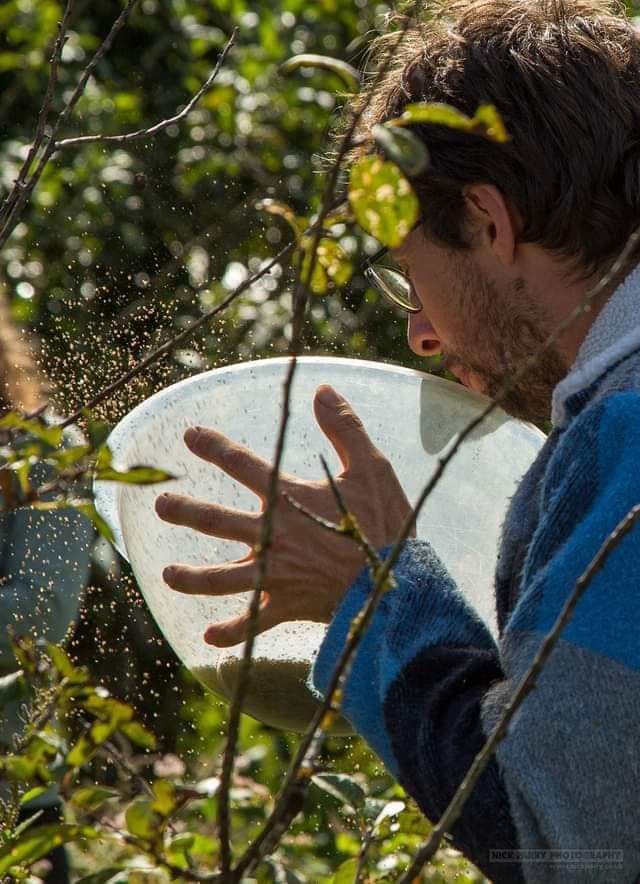2023
Aims and objectives
The Ediculture Community Supported Seed Initiative aims to create a membership support network for the Ediculture seed bank. Members must be a local (within south wales) community food growing group/initiative.
.
Why local?
As the ediculture seed collection is based in south wales at Coed hills, we have come to understand that local seeds are most adapted to the local conditions they have been saved in. Many of our seeds go back 10 years or more at Coed. Though the subtle adaptations may be small we believe this to be important.
Also, the benefits to the community groups are more accessible if the member group is local. (see section on benefits).
.
Criteria-
Members can include any community food growing project in the following areas:
*allotment projects
*back garden projects
*school projects
*green spaces
*educational organisations
The focus doesn’t necessarily have to be food growing but the seeds will be predominantly edible plants so we will prioritise food growing projects.
.
Benefits
The benefits to local community growing groups across south wales are:
*Accessing seeds from the ediculture seed bank at a reduced cost (prices given below)
*Accessing seed saving workshops at reduced cost
*Offering support and advice to your group on growing more local food, food culture in general and seed saving at home.
.
How?
We will distribute every winter a number of fresh seeds saved that year to community groups based on their membership agreement.
We are currently open to 10 groups to sign up for membership.
Each group can sign up to three tiers of membership
£25 a year gets you – 20 packs of seeds
£50 a year gets you – 45 packs of seeds
£75 a year gets you – 80 packs of seeds
Members are able to access the list of seeds available and give general options for what seeds they would like that year, but we can’t guarantee to have a full selection of all the things they they might be wishing to grow. It will have an element of ‘pot luck’ in it. What it will offer however is the vast quantity of seeds, cheeper than anything you will find online, offering excelent value for money, and high quality seeds with great germination rate, strong plants, and varieties which are particularly suitable for home production of food, along with the above benefits of being a member.
All tiers of membership have the same access to seed saving workshops at half price their usual cost. They can also hire our ediculture services at a reduced cost, e.g. – running workshops or consultancy for their particular site.
.
How to sign up
To sign up send an email to ediculture@gmail.com stating your name, what project you are involved with, a contact number and what tier membership you are interested in signing up for. Alternatively, and if you would like more infomation, call Stephen on 07507578885.
Once we know your membership tier and have an addess for you we will get your seeds to you in the post asap. We will also be able to give you advice
.
Background
The ediculture seed bank comprises about 150 varieties of annual plants which we have come to rely upon over the years for food production at a general self-sufficiency level and also at the level of family / small community growing. They are not so suitable for commercial production but are arguably more suitable for small scale than some of the commercially available seeds on the market. Being an unregistered seed bank, and not intending in the near future on growing it much beyond the capacity we already function at, we are aware that it makes sense for us, who desire to educate people about the small scale local growing methods, to be saving our own seeds and sharing them within the local community.
Over the past 10 years we have been distributing our seeds through seed swaps and a few online sales, but this has been hard work, time consuming and inefficient. Often seeds would become old and unusable, and waste was created. Hence This initiative came out of a desire to minimise the waste of seeds not getting planted while they are fresh and to create a guarantee to the usage of the seeds grown and harvested at Coed for the seed bank, much like the way CSA’s work for horticulturalists.
Also, the processes of seed saving which we have found to be most useful in terms of local production often contradict large scale commercial methods of saving seeds, in that, whilst commercial production aims for genetic purity, and clearly identifiable varieties, home scale production benefits from local crosses, especially in the case of the brassica family, where genetic purity can create more difficulty with plants prone to more disease, slug damage, and germination issues. As we have found over the years, crosses, whilst they may not look like the original plant, have resilience, stronger flavours, are more akin to wild plants, self sow easier, yield higher, and survive better.
One of the compromises is that open crosses can give more sporadic, extended harvesting windows, as opposed to all yielding at once, a key desire for market garden production. They can also often loose some of the subtleties of flavour that genetic purity offers. Its a compromise at the end of the day, and one we have been making for many years without any major drawbacks. We still buy in a small amount of seed, in particular, cabbages, cauliflowers, calabrese, beetroot, carrots, a few new chilies from time to time, and occasionally squash and sweetcorn to refresh our stocks with pure genetic lines. Time will tell how this works.
We are commited to continuing to save seeds at Ediculture and learning from our journey into seeds.

